Scuba Diving in Colombia: Here's Why It's Perfect
Whether you're a learner or a pro, Taganga on Colombia's Caribbean coast is a fantastic spot for scuba diving. Before you go, here are our scuba expert's top tips for a safe and unforgettable dive.
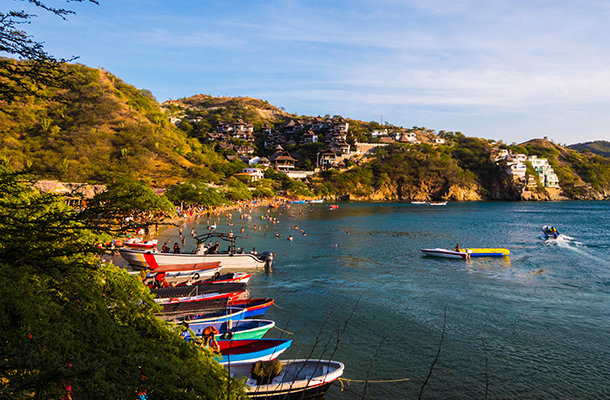 Photo © iStock/holgs
Photo © iStock/holgs
- Diving in Taganga, near Santa Marta, Colombia
- Choosing a dive school in Taganga
- Before you dive in Taganga
- Tips for your first dive
Diving in Taganga, near Santa Marta, Colombia
Taganga is the most popular spot for prospective divers. Just 10 minutes outside heavily developed Santa Marta, this unassuming little town is home to a plethora of dive shops.
Although it might not fit with your expectations of a Caribbean village, Taganga's cacti-covered hills and cozy little beaches will quickly win you over. The diving isn't quite as colorful as the Great Barrier Reef and the water can be surprisingly cold but at a mere fraction of the cost, who's complaining?
The starting point for most Ciudad Perdida (Lost City) treks and gateway to the luscious Tayrona National Park, Taganga forms a lazy little eddy in the stream of backpackers flowing through Colombia.
Whether they're planning to dive, trek, or just chill out, most travelers end up sticking around Taganga much longer than they expected. So even if diving wasn't on your itinerary, it's worth poking your head into one of the dive shops and checking out the options.
There is one ATM in Taganga, which doesn't work with many international cards, and is often empty even when it does. You might have to make a short trip out to Santa Marta to get the cash for your dives. Be wary of people watching you while you make a withdrawal, and avoid doing it at night. The majority of the city's ATMs are near the Edificio de los Bancos, and criminals know to hang around and watch for tourists taking out a lot of cash.
Choosing a dive school in Taganga
Finding the right dive school is the first and most important step. If you're an expert, you'll know exactly what you're looking for, but for beginners the number of shops can be overwhelming. Poseidon and Ocean Lovers are two reliable companies if you need a place to start.
There are lots of good deals on offer, but remember, low cost and high competition has led some operators to cut corners. Take a walk along the beachfront and look into a few of the shops, taking a thorough look at the gear. You don't have to be a technical expert: if the equipment looks dirty, damaged, or poorly maintained, you probably want to move along.
Most instructors will speak good English, but if you find one who's friendly and enthusiastic, you'll have a much more enjoyable experience.
Most companies will offer all sorts of courses and combinations of different accreditations, from complete novice to the most technical and advanced. You don't want to be hitting the same sites over and over again, so ask which beaches and coves you'll be visiting. You can even work out your own little custom dive schedule, especially if you're with a group.
It will be cheapest if you do a few dives on one boat trip, so it's usually best if you set aside full days for diving, rather than just a morning or afternoon. However, you shouldn't do more than three dives a day, so be wary of any company that tries to squeeze in four or five (and hence more profit for them).
Before you dive in Taganga
Once you've found a course, you're all set to go. There are a few things to remember to make sure all goes smoothly:
-
Don't drink too much the night before. You'll be starting early to make the most of the day and you want to be on the ball. Diving with a hangover is not pleasant and can be downright dangerous.
-
Even if you're just starting with theory work, you need to stay sharp. This is the basic information that will keep you safe throughout your diving career.
-
Don't eat too much either, although the heat in Taganga means you're unlikely to be tempted. Most of the dive schools will provide small meals throughout the day and will have worked out the best times to eat to suit your schedule.
-
Make sure to drink a lot of water, which should also be provided. The combination of salt water and hot sun on the boat can dehydrate you very quickly.
-
If you do go out in Taganga, be wary of the drug dealers who lurk around the bars and beach huts. They are often working with the police to extort bribes from tourists. If they approach you, just walk away.
-
Preparation is one of the most important aspects of a successful dive. Make sure you go over your gear and your dive plan thoroughly. Your instructor will help you out a lot, but don't rely on them. These guys do this day in, day out, all year, so they can get a bit jaded and skim over steps. Also, doing it yourself is the best way to learn.
-
If you think you've found a problem or are confused, don't be afraid to ask. Biting your tongue out of shyness will seem a bit silly if a hose bursts 15m under water.
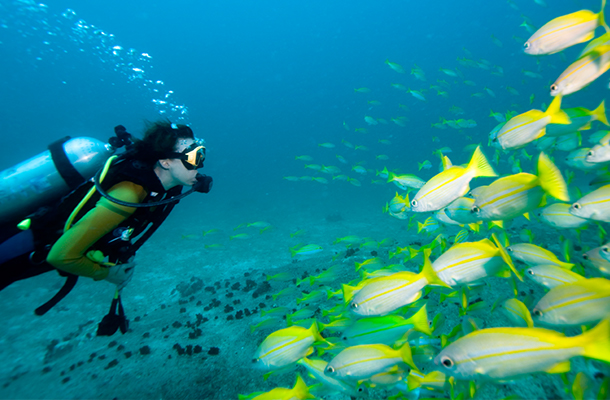
Tips for your first dive
When it finally comes to taking the plunge, there are a few key things that will lead to an enjoyable and memorable dive, all of which will be covered in your course.
Relax and breathe slowly. It may feel unnatural at first, but whatever you do, don't hold your breath. This can cause all sorts of problems and lead to lung injuries. Inhale and exhale fully, get into a rhythm and stick with it.
Equalize. Forgetting this crucial step can leave you with permanent damage to your ears and sinuses. Pain as you descend will make it tough to forget, but try not to leave it until you're uncomfortable.
Stick with your dive buddy and keep your instructor in sight. You may get mesmerized by the underwater scenery, but just make sure to look up every once in a while to check you're not drifting away from the group.
The goggles, hoses, and tank act like blinders, so it can be easy to lose sight of someone momentarily. Don't panic. Just do a spin and have a look around you. Don't forget to check above and below you, diving's a 3D sport.
If you are separated, perform a slow, controlled ascent. Even if you're desperate to surface, a good rule of thumb is to rise slower than your bubbles. In the end, you'll probably find you're only a few metres from the boat.
Have fun. Lots of people get so caught up in remembering all the technical stuff they learned that they forget to enjoy their first dives. You're not expected to get everything single thing spot-on your first time. Your instructor is there to make sure everything goes smoothly and to help if something should go wrong.
The number one thing is never dive alone, even if you're an experienced diver. Taganga is full of keen divers, so just ask if anyone wants to tag along. It will work out cheaper for both of you and, if anything should go wrong, you'll definitely be glad you brought your buddy and their emergency regulator.
Check any hire gear closely. Some shops are running with some pretty old equipment. Don't be afraid to bring up any issues with the stuff they bring out. It's easy for them to quickly grab another bottle or dive computer, but could ruin your whole day if something breaks on the boat or worse, underwater.
Make a solid dive plan and run through it with your dive partner and boat driver, if you have one. Make sure the driver fully understands where and when you're surfacing. You don't want to pop up only to find he's disappeared round the next head.
Take plenty of food and water with you. Low blood sugar levels can be dangerous while diving, as is dehydration.
Diving in Colombia is perfectly safe, but only if you maintain safety standards. You're on holiday, but don't be tempted to cut corners. No matter what kind of bargain you get, it's not worth it if something goes wrong.
Related articles
Simple and flexible travel insurance
You can buy at home or while traveling, and claim online from anywhere in the world. With 150+ adventure activities covered and 24/7 emergency assistance.
Get a quote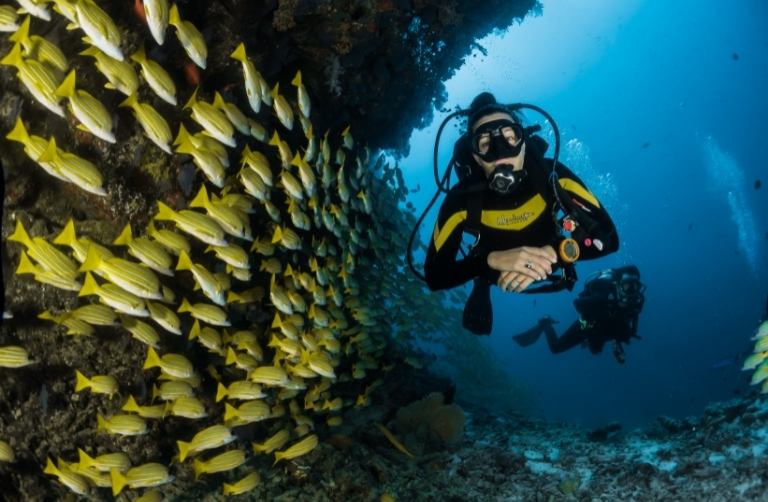
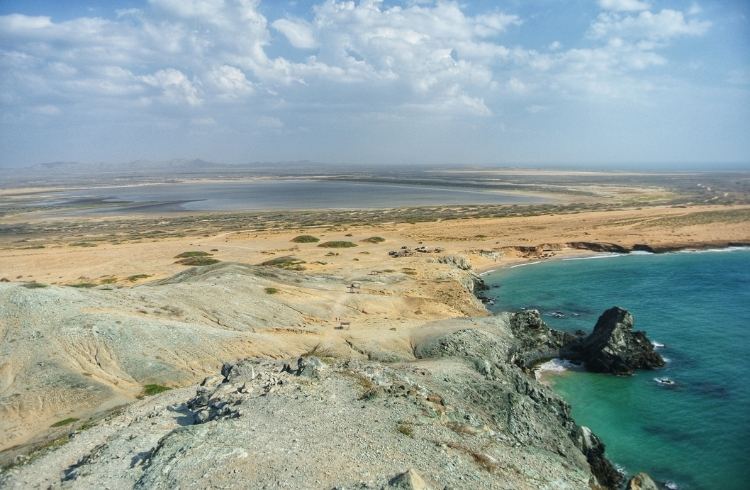
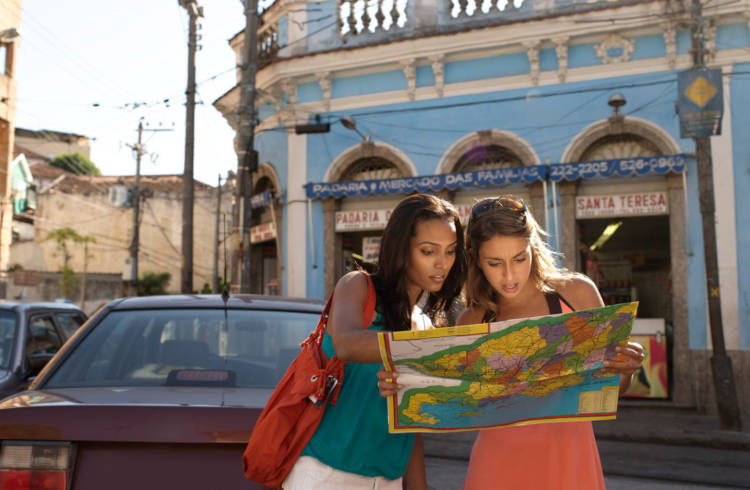
4 Comments
I've been there last year. Absolutely amazing! I believe that any diver should visit Colombia. It's worth it. I have a couple of dives logged into my logbook from https://dive.site website and I can't wait to go diving again.
My wife and I have always wanted to try scuba diving, so thanks for sharing this. I like your point about staying hydrated beforehand. We'll be sure to do this if we ever go diving so we don't get fatigued under the water. http://blackbirdresort.com/scuba-diving/
Great article, just so you know Octopus does not exist anymore. It is now called Ocean Lovers, its under new ownership and is a great shop! www.oceanloverstaganga.com
Hi Demi,
Thanks for letting us know! I have just updated the article with Ocean Lovers and the link you provided.
Cheers,
Amelia@WorldNomads